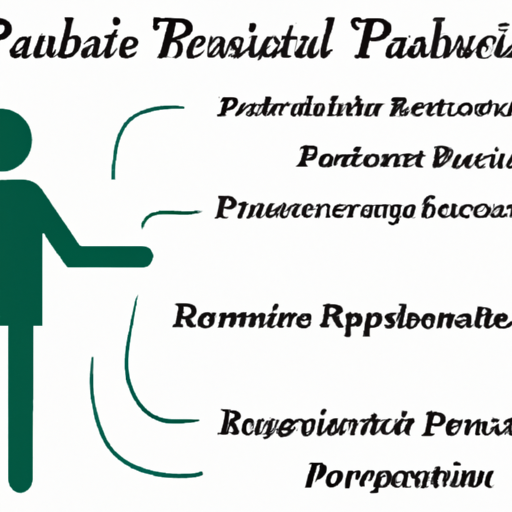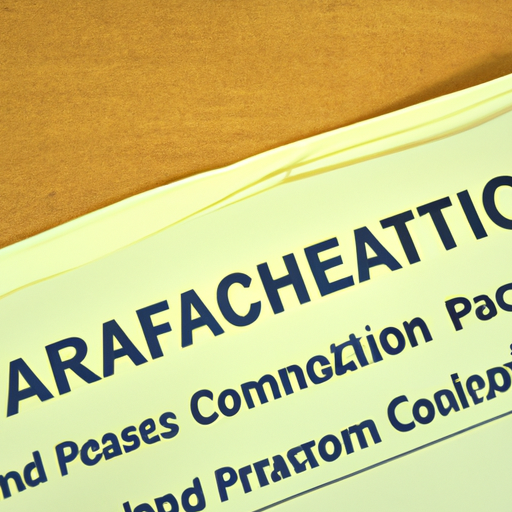Unveiling the Unsung Heroes: Demystifying the Paraprofessional Job Description
In a bustling world where the spotlight often shines on high-profile roles and glamorous occupations, there exists a remarkable group of individuals who quietly transform lives, often behind the scenes. Ladies and gentlemen, let us set our gaze upon the paraprofessionals – the unsung heroes who embody the true spirit of dedication and compassion. While their job description may appear mysterious to some, the time has come to unravel the enigmatic role these remarkable individuals play in shaping our communities.
Paraprofessionals, also known as instructional aides, teacher assistants, or classroom support staff, form a crucial pillar within the educational landscape. Within the four walls of a school, their invaluable contributions bring warmth, knowledge, and guidance to countless souls – be it wide-eyed kindergarteners or inquisitive high school students.
Contrary to the conventional image that accompanies the term “job description,” the world of paraprofessionals is far from monotonous or rigidly defined. Within their versatile and adaptive roles, these dedicated professionals adeptly navigate a spectrum of tasks tailored to support educators, administrators, and most importantly, students. Whether assisting in curriculum implementation, providing one-on-one support, managing behavior, or creating a nurturing classroom environment, these neutral-toned shining stars epitomize flexibility and resilience.
Let us embark on an insightful journey where we delve into the intricacies of the paraprofessional job description. Witness these remarkable individuals surpass the ordinary to profoundly impact the lives of students, educators, and the very fabric of our educational systems. Prepare to have your preconceived notions shattered and your understanding expanded as we pay homage to the unsung heroes of education – the revered paraprofessionals.
Table of Contents
- Introduction to Paraprofessional Roles and Responsibilities
- Understanding the Duties and Expectations of a Paraprofessional
- Qualifications and Education for Paraprofessional Positions
- Essential Skills and Competencies for Paraprofessionals
- A Day in the Life of a Paraprofessional: Tasks and Challenges
- Working Collaboratively with Teachers and Administrators as a Paraprofessional
- Supporting Students with Special Needs: Strategies and Best Practices
- Building Effective Relationships with Students, Parents, and Colleagues as a Paraprofessional
- Enhancing Professional Growth and Advancement Opportunities for Paraprofessionals
- Final Thoughts

Introduction to Paraprofessional Roles and Responsibilities
Paraprofessionals play a crucial role in various fields, holding positions that require a unique blend of skills, knowledge, and dedication. Their responsibilities may vary depending on the specific job, but they are often responsible for providing support and assistance to professionals in their respective industries. From education to healthcare, paraprofessionals have become an integral part of the workforce.
In the realm of education, paraprofessionals work closely with teachers to provide valuable support to students with diverse needs. They play a role in classroom management, ensuring a positive learning environment for all. Paraprofessionals may also provide one-on-one assistance to students with disabilities or learning difficulties, helping them understand and complete assignments. Moreover, they contribute to the overall development of students by addressing their unique needs, offering encouragement, and fostering a sense of belonging.
In the healthcare sector, paraprofessionals are vital members of the team, working alongside doctors and nurses to provide patient care. They assist with basic medical procedures, such as taking vital signs, administering medications, and maintaining patient records. Additionally, paraprofessionals offer emotional support to patients and their families, making their hospital or clinic visits more comfortable. Their compassionate presence and attention to detail ensure that patients receive the best care possible during their stay.
Paraprofessional roles and responsibilities extend beyond the aforementioned fields, with opportunities in various industries. A profession that demands patience, adaptability, and a desire to make a difference, paraprofessionals contribute significantly to the success of organizations and the well-being of individuals they serve.
Understanding the Duties and Expectations of a Paraprofessional
A paraprofessional plays a crucial role in supporting educators and students within a school environment. While the exact duties and expectations may vary depending on the specific educational setting, there are some general responsibilities that paraprofessionals are typically tasked with.
- Providing assistance in the classroom: Paraprofessionals often work alongside teachers to provide individualized attention to students, assisting with tasks such as reading, writing, and math skills development. They may also help with classroom management and the implementation of lesson plans.
- Supporting students with special needs: Many paraprofessionals are assigned to work with students who have special needs or disabilities. They may help these students with daily activities, monitor their progress, and provide additional support as necessary.
Furthermore, paraprofessionals are expected to maintain a safe and inclusive learning environment. This involves promoting positive behavior, resolving conflicts, and fostering a supportive atmosphere for all students. They may also be involved in assisting with extracurricular activities and organizing educational materials.

Qualifications and Education for Paraprofessional Positions
Qualifications:
- A high school diploma or equivalent
- Experience working with children or in a related field
- Strong communication and interpersonal skills
- Ability to follow instructions and work as part of a team
- Patience and understanding to support students with diverse needs
Education:
- Completion of a paraprofessional training program or certification preferred
- Additional coursework or certification in education or related disciplines is a plus
- Continued professional development and training to stay updated in best practices
Essential Skills and Competencies for Paraprofessionals
Are you interested in a rewarding career as a paraprofessional? To thrive in this role, there are certain essential skills and competencies that you should possess. Let’s explore the job description and discover what it takes to excel as a paraprofessional:
1. Effective Communication
As a paraprofessional, strong communication skills are paramount. You will be working closely with students, teachers, and other staff members, requiring clear and concise communication to provide effective support. Excellent listening skills, the ability to express ideas and instructions clearly, and adapting your communication style according to different individuals’ needs are all essential.
In addition, being able to collaborate effectively in a team environment is crucial. Working alongside teachers and administrators, you’ll contribute to educational plans, gather and relay important information, and help foster a positive learning atmosphere for students.
2. Flexibility and Adaptability
Paraprofessionals often face a dynamic and ever-changing work environment. Flexibility and adaptability are key to successfully meeting the diverse needs of students and teachers alike. From assisting in different subjects, adjusting teaching strategies according to individual learning styles, to accommodating changes in schedules or classroom assignments, being able to adapt quickly and smoothly is essential.
Moreover, demonstrating a growth mindset and embracing new challenges helps you make a significant impact in the lives of students. Adjusting your approach to meet the evolving educational landscape ensures that you can provide the best support possible.
A Day in the Life of a Paraprofessional: Tasks and Challenges
As a paraprofessional, your day is filled with a wide range of tasks and challenges. One of the key responsibilities of a paraprofessional is to assist teachers in the classroom. This involves providing support to students with special needs, helping them with assignments, and ensuring they have the tools and resources they need to succeed. You will also collaborate with classroom teachers to develop lesson plans and create a positive learning environment.
In addition to classroom assistance, a paraprofessional also helps with administrative tasks. This can include grading assignments, maintaining student records, and organizing classroom materials. You may also be responsible for supervising students during recess or lunch breaks. Flexibility is essential in this role, as you will need to adapt to the needs of the students and the classroom environment. Patience, empathy, and excellent communication skills are crucial when working with students who may require additional support.
Working Collaboratively with Teachers and Administrators as a Paraprofessional
As a paraprofessional, one of the key responsibilities is to work collaboratively with teachers and administrators. This collaborative effort plays a pivotal role in creating a supportive environment for students and ensuring their academic success. By working hand in hand with teachers, you will have the opportunity to not only assist in classroom activities but also provide valuable input and insights based on your observations and interactions with students.
Being a paraprofessional means being a team player. Whether it’s helping teachers with lesson planning, organizing materials, or providing one-on-one support to students, your collaboration with teachers will ultimately enhance the learning experience for everyone involved. By actively participating in team meetings and sharing your ideas, you can contribute to the collective growth and development of the students. Additionally, as a paraprofessional, you will also collaborate closely with administrators, providing them with valuable feedback on student progress and behavior. Your insights can aid in decision-making processes and help shape school policies to best suit the needs of the students. Remember, effective collaboration is key to fostering an inclusive and supportive educational environment, where the potential of each student can be realized.
Supporting Students with Special Needs: Strategies and Best Practices
As a paraprofessional working with students who have special needs, your role is crucial in ensuring their success and overall well-being. You will provide support and assistance to these students in various educational settings, working closely with teachers, therapists, and other professionals.
To excel in this role, there are several strategies and best practices that you should be familiar with:
- Effective Communication: Clear and precise communication is key when working with students with special needs. Use simple language and provide visual aids if necessary to enhance understanding.
- Individualized Approach: Each student is unique, and you must tailor your support to meet their specific needs. Get to know their strengths, challenges, and preferences, and use this information to assist them in their learning journey.
- Collaboration: Collaboration with the entire educational team is crucial for successful student outcomes. Work closely with teachers, therapists, and other professionals to share knowledge and strategies, ensuring a comprehensive and consistent approach.
- Patience and Empathy: Students with special needs may have different learning paces and require extra support. Show patience and understanding, offering encouragement and celebrating their achievements.
By employing these strategies and best practices, you will play a vital role in supporting students with special needs, fostering their growth, and helping them reach their full potential.
Building Effective Relationships with Students, Parents, and Colleagues as a Paraprofessional
One of the key responsibilities of a paraprofessional is building effective relationships with students, parents, and colleagues. This not only helps in creating a positive and supportive learning environment but also enhances the overall educational experience. Here are some strategies to develop strong connections:
- Active Listening: To build effective relationships, it is essential for paraprofessionals to listen actively to the concerns, ideas, and feedback of students, parents, and colleagues. This shows respect, empathy, and understanding.
- Open Communication: Maintaining open lines of communication is vital in nurturing relationships. Paraprofessionals should encourage students, parents, and colleagues to express their thoughts, concerns, and questions. Responding in a timely and respectful manner demonstrates commitment and professionalism.
- Collaboration: Working collaboratively with students, parents, and colleagues establishes a sense of teamwork and enables the sharing of ideas and resources. Paraprofessionals can actively contribute to planning and implementing activities, creating a sense of shared ownership.
Furthermore, establishing trust, being reliable, and demonstrating confidentiality are crucial aspects of building effective relationships as a paraprofessional. By utilizing these strategies, paraprofessionals can foster a positive and supportive environment that empowers students, engages parents, and creates a strong bond among colleagues.
Enhancing Professional Growth and Advancement Opportunities for Paraprofessionals
Paraprofessional Job Description
Are you ready to take your career to the next level? As a paraprofessional, you have already proven yourself as an invaluable asset to the team. Now, it’s time to enhance your professional growth and explore endless advancement opportunities. At our organization, we recognize the immense potential in our paraprofessionals and are committed to providing the necessary resources and support to help you excel.
What you can expect:
- Collaborative Learning Environment: Join a dynamic team of passionate professionals who are eager to share their knowledge and expertise.
- Specialized Training Programs: Take advantage of a wide range of training programs tailored to your specific interests and career goals, ensuring you are equipped with the most up-to-date skills and knowledge.
- Growth Opportunities: Opportunities for advancement are plentiful. We believe in promoting from within and providing paraprofessionals with a clear pathway for growth and success.
Key Responsibilities:
- Supporting teachers and students in the classroom with various tasks, including instructional support and behavior management.
- Assisting with the development and implementation of individualized education plans (IEPs) for students with special needs.
- Collaborating with teachers to create engaging and inclusive learning environments.
Take the next step in your professional journey and discover a rewarding career that recognizes your dedication and commitment as a paraprofessional. Join our team today!
Final Thoughts
As we wrap up this exploration into the world of paraprofessionals and their responsibilities, we are left with a profound appreciation for the unsung heroes who tirelessly support professionals across various industries. From education to healthcare, paraprofessionals serve as the backbone of countless organizations, lending their skills, knowledge, and compassionate hearts to the betterment of others.
In this article, we have delved into the multifaceted nature of a paraprofessional’s job description, uncovering the extraordinary scope of their duties that often go unnoticed. Like chameleons, they adapt seamlessly to their environments, blending in effortlessly while providing crucial assistance to professionals in need. Their willingness to go above and beyond is truly commendable.
Whether it be offering academic guidance to students on the cusp of achieving their dreams or easing the burdens of overwhelmed medical staff, paraprofessionals bring their unique touch of expertise to the table. They excel in communication, organization, and empathy, grasping the essence of what it means to work harmoniously as part of a team.
While their role may not always take center stage, paraprofessionals are the unsung glue that holds everything together. Without their unwavering commitment and dedication, the wheels of progress would grind to a halt. Let us not forget the countless lives they touch and the impact they make, quietly stitching the fabric of success within their respective fields.
So, the next time you witness a paraprofessional diligently fulfilling their duties, take a moment to acknowledge the quiet heroes among us. Their selfless contributions, hidden in plain sight, reshape the lives of many and elevate the professional realm to greater heights.
As we bid adieu to this article, we implore you to appreciate the invaluable role paraprofessionals play in society, for their impact extends far beyond the boundaries of job descriptions. Let us celebrate these exceptional individuals and recognize the extraordinary work they perform in the shadow of giants.
